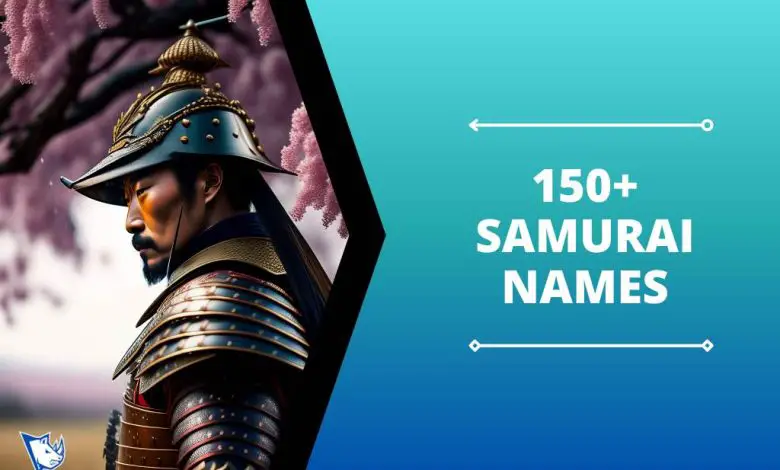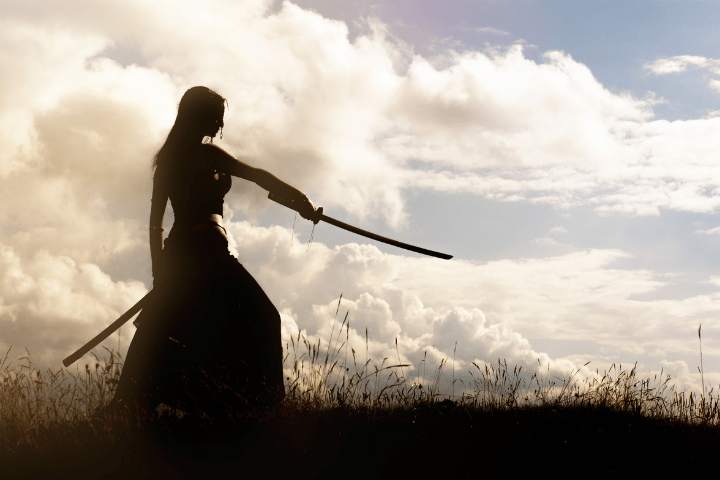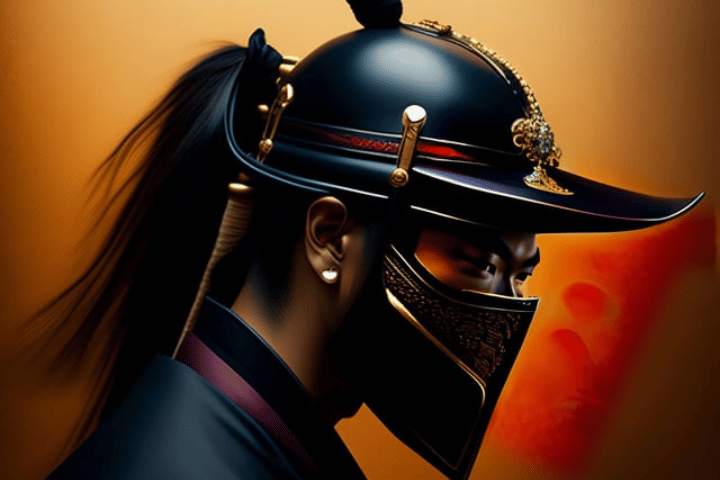150+ Best Samurai Names Ideas

Samurai names hold great significance in Japanese culture, reflecting the noble and fierce essence of the warriors who bear them. These names are carefully chosen to embody certain qualities such as strength, honour, and bravery.
One interesting aspect is that samurai often had multiple names throughout their lives; their childhood name, adult name, and even posthumous names after their deaths.
These nicknames could range from poetic descriptions like The Soaring Crane or The Silent Thunder to more menacing titles like The Flames of War or The Demon Slayer. These monikers not only added an element of mystique but also served as a reminder of the warrior’s reputation on the battlefield.
Famous Samurai Names
Dive into the captivating world of samurai legends with our compilation of renowned names that echo bravery, skill, and unwavering devotion to honour.
Abe Masakatsu— This early Edo warrior was famous.
Sanada Komatsuhime— She was a late Edo female samurai.
Mori Ranmaru— He served Sengoku warlord Oda Nobunaga loyally.
Taigen Sessai— Priest and strategist under Toyotomi Hideyoshi.
Takeda Nobushige— The Sengoku period general of the Takeda army.
Hattori Hanzo— Famous samurai who served Tokugawa Ieyasu during Sengoku.
Maeda Toshinaga— He was an Edo daimyo in the Kaga Domain.
Ii Naosuke— He helped eliminate Japan’s isolation as an Edo politician.
Sakakibara Yasumasa— The imperial army general during the Boshin War.
Miyamoto Musashi— A famous Japanese swordsman, philosopher, and Book of Five Rings author.
Sanada Yukimura— Legendary Sengoku samurai who fought Tokugawa Ieyasu.
Reizei Takatoyo— He was an Edo-era samurai and poet.
Shibata Katsuie— He was a Sengoku daimyo who served Oda Nobunaga.
Yagyū Munenori— His swordplay and martial arts were famous in Edo.
Mori Yoshinari— He was a Sengoku Mori clan strategist.
Matsudaira Katamori— The Bakumatsu period daimyo served the Tokugawa shogunate.
Saigō Masako— Samurai and poet in the Bakumatsu period, she was part of the Kaishin-no-Kai.
Miura Anjin— Tokugawa Ieyasu urged him to build Japan’s first Western-style naval fleet after he was the first English navigator to visit in 1600.
Takahashi Shigetane— He was a Bakumatsu-era samurai and Confucian scholar for the Mito clan.
Kataoka Mitsumasa— He was a Sengoku samurai and strategist for the Hojo clan.
Toki Yorinari— He was a daimyo and a key Tokugawa retainer during the Edo era.
Minamoto no Yoshitsune— He was a legendary samurai of the late Heian and early Kamakura Genpei War.
Female Samurai Names
Unlock the secrets behind female samurai names and give your characters an unforgettable identity that echoes their warrior spirit.
Tomoe— Female samurai Tomoe was faithful and brave.
Noriko— Noriko was a Sengoku samurai legend.
Taira— Taira was a powerful late Heian warrior.
Rika— Muromachi samurai Rika was a skilled swordswoman.
Ran— Female samurai Ran served the Ashikaga Shogunate during the Sengoku period.
Yoriko— Female samurai Yoriko was fearless in battle.

Chiharu— Legendary Edo samurai Chiharu served the Tokugawa Shogunate.
Yoko— Sengoku samurai Yoko was brave and skilled.
Tsunade— Late Sengoku Samurai Tsunade was bold and strategic.
Sumiko— Sumiko was a Toyotomi clan warrior during the Azuchi-Momoyama period.
Vernita— Female warrior Vernita fought alongside the Shimazu clan in Sengoku.
Akiko— Her courage and martial arts skills made Akiko an Edo-era samurai.
Mika— Mika was a legendary Edo-era Tokugawa Shogunate samurai.
Yuri— Yuri was an Edo-era samurai famed for her swordplay.
Kaede— Late Sengoku samurai Kaede was a skilled spearman.
Torii— Edo-era warrior Torii Tamiko was devoted and honourable.
Tamiko— The Toyotomi clan employed female samurai Tamiko during the Azuchi-Momoyama period.
Megumi— Female warrior Megumi fought alongside the Takeda clan during Sengoku.
Ritsuko— Edo-era samurai Ritsuko was a commander and tactician.
Rie— Legendary Edo samurai Rie served the Tokugawa Shogunate.
Nana— Nana was an Edo-era samurai famed for her katana skills.
Miho— Late Sengoku samurai Miho was valiant and courageous.
Tsukiko— Edo-era samurai Tsukiko was known for her martial arts skills.
Ayame— Edo-era samurai Ayame was a skilled bowman.
Ito— Ito was a Sengoku samurai known for her naginata skills.
Jinx— Jinx, an Edo-era warrior, was known for her bravery and strength.
Takeda— Sengoku-era samurai Takeda was skilled at horseback.
Kana— Kana, an Edo-era samurai, was loyal to the Tokugawa shogunate.
Sayuri— Sengoku samurai Sayuri was a skilled swordswoman.
Sakura—Sayuri was a Sengoku samurai famed for her kindness. The Edo period samurai Sakura was noted for her steadfast dedication to justice.
Yumi— Yumi was a Sengoku samurai famed for her loyalty.
Keiko— Edo-era samurai Keiko was known for her valour in battle.
Yumiko— Yumiko was an Azuchi-Momoyama samurai famed for her clever military tactics.
Yoshiko— Edo-era samurai Yoshiko was known for her martial arts skills.
Mariko— Sengoku samurai Mariko was fierce and devoted.
Minako— Minako was an Edo-era female samurai with great spear skills.
Oichi— Sengoku samurai Oichi was known for her familial loyalty.
Hikaru— Hikaru was an Edo-era warrior known for her archery.
Machi— Machi, an Azuchi-Momoyama warrior, was faithful and brave.
Umi— Umi was an Edo-era warrior known for her horseback riding.
Aiko— Sengoku-era samurai Aiko was known for her swordplay.
Yamakawa— Edo-era female warrior Yamakawa was known for her valour in battle.
Hana— Sengoku samurai Hana was noted for her strategic military tactics.
Megohime— Megohime was an Azuchi-Momoyama period samurai known for her martial arts skills.
Nanako— Edo-era samurai Nanako was bold and devoted.
Suzume— Sengoku-era female samurai Suzume was a talented bowman.
Kaihime— Kaihime, an Azuchi-Momoyama warrior, was known for her clan loyalty.
Asuka— Edo-era female samurai Asuka was famous.
Tomoe— Tomoe, a Sengoku-era female warrior, was famous for her valour in battle.
Jiyu— Jiyu was an Azuchi-Momoyama samurai noted for her horseback riding.
Yuuna— Yuuna was an Edo-era female samurai known for her swordplay.
Oyuki— Sengoku samurai Oyuki was known for her bravery and strength in battle.
Yui— Yui, an Azuchi-Momoyama samurai, was known for her military skills.
Emiko— Edo-era samurai Emiko was known for her martial arts skills.
Masako— Masako was a Sengoku samurai famed for her intelligence, strength, and loyalty.
Male Samurai Names
Find the perfect name for your hero or protagonist from our extensive list of male samurai names. Immerse yourself in a tradition that spans centuries.
Osamu— The Battle of Sekigahara saw valiant samurai Osamu.
Yoshiro— Late Heian samurai Yoshiro was known for his combat skills.
Sanada— Samurai Sanada was famous during the Sengoku period.
William— Tokugawa Ieyasu made English seaman William Adams a samurai.
Kusunoki— Kusunoki, a Sengoku samurai, was valiant and faithful to his lord.
Miyamoto— Miyamoto was a Sengoku samurai known for his swordplay and strategy.
Ken— Ken, a Sengoku samurai, was a tactical genius and valiant warrior.
Tsunenari— Tsunenari was a key Genpei War samurai.
Shimazu— Famous samurai Shimazu fought at Sekigahara.
Susumu— The late Heian samurai Susumu was famous for his loyalty and dedication.
Yoji— Sengoku samurai Yoji was brave and honourable.

Nobuhisa— Nobuhisa, an Edo-era samurai, was brave and skilled in warfare.
Esumi— Sengoku samurai Esumi was known for his ferocity in battle.
Yori— Genpei War samurai Yori was bold and devoted.
Nobunari— Nobunari, a Sengoku samurai, was known for his tactics and allegiance to his lord.
Yoshitsune— Genpei War samurai Yoshitsune was renowned.
Tadashi— Samurai Tadashi was fearless and skilled in warfare.
Kenji— Kenji was a skilled Genpei War samurai commander under the Hojo clan.
Yutaka— Late Heian samurai Yutaka was bold and skilled.
Genji— Genji was a Minamoto clan samurai commander during the Genpei War.
Uesugi— Sengoku samurai clan Uesugi was powerful.
Adam— Samurai Adam was fearless and skilled in warfare.
Imagawa— Suruga Province was governed by the great Sengoku samurai clan Imagawa.
Oda— Sengoku samurai Oda was known for his ferocity and strategic ability.
Akio— Samurai Akio fought bravely at the Siege of Osaka.
Hideo— Hideo was a Tokugawa Ieyasu samurai during the Battle of Sekigahara.
Kojiro— Kojiro was an African samurai.
Masaru— A famous samurai, Masaru served under the Toyotomi clan at the Siege of Osaka.
Daisuke— Daisuke led the Hojo clan in the Genpei War and was a competent warrior.
Kaito— Samurai Kaito fought in the Siege of Odawara.
Edward— Edward was a courageous and honourable Azuchi-Momoyama samurai.
Date— Date was a prominent samurai clan that ruled much of Tōhoku during the Sengoku period.
Takeshi— The Battle of Sekigahara saw valiant samurai Takeshi.
Ichiro— The Battle of Nagashino saw valiant samurai Ichiro.
Rinoie— Rinoie bravely fought the Taira clan in the Genpei War.
Saigo— Saigo was a late Edo samurai.
Toyotomi— Toyotomi was a powerful Sengoku warlord.
Akechi— Sengoku samurai Akechi was known for his faithfulness.
Teruo— Late Heian samurai Teruo was faithful and dedicated.
Yasumi— The Battle of Sekigahara saw valiant samurai Yasumi.
Ashikaga— The Muromachi-era Ashikaga samurai family was formidable.
Uesugi— A powerful Sengoku daimyo, Uesugi fought.
Jiro— In the Battle of Uedahara, samurai commander Jiro fought.
Takahiro— Takahiro was a Sengoku samurai known for his bravery.
Kobe— Former Edo samurai Kobe was known for his loyalty and fighting arts.
Naru— Legendary Edo samurai Naru was brave and faithful to his lord.
Shinji— Shinji was a brave Sengoku samurai known for his commitment.
Taro— Sengoku samurai Taro was known for his bravery in battle.
Cool Samurai Names
Here are some Cool samurai Names.
Sachiko— Sachiko was a Sengoku-era samurai with military tactics expertise.
Tsukiko— Tsukiko, an Edo-era samurai, was faithful and dedicated.
Eiji— A competent samurai, Eiji fought at the Siege of Osaka.
Tokugawa— A great Edo shogun, Tokugawa unified Japan.
Fujii— Fujii was a Sengoku warrior known for his combat skills.
Tetsuo washi— Late Heian samurai Takeshi was brave and devoted.
Ren— Samurai Ren was famous for his Genpei War bravery.
Oishi— Famous samurai Oishi was loyal to the Asano clan.
Nakano— Edo-era female samurai Nakano was faithful to her lord.
Nagahide— An influential Sengoku warrior, Nagahide was strong and skilled in warfare.
Akai— Edo-era female samurai Akai was devoted to her lord.
Mayumi— Female samurai Mayumi was brave and strong in battle.
Shizuka— Sengoku-era samurai Shizuka was an archer.
Tomiko— The Minamoto clan used Heian-era female samurai Tomiko.
Yasu— Late Heian samurai Yasu was faithful and strong.

Saburo— Saburo was a brave and skilled Sengoku Samurai.
Sayoko— Sayoko was a Sengoku warrior famed for her archery.
Saki—Saki, a Genpei War samurai, was fearless.
Komatsuhime— Sengoku female samurai Komatsuhime was loyal to the Toyotomi clan.
Satoru— The late Heian warrior Satoru was brave and strong.
Michiko— Edo-era samurai Tsukiko was known for her dedication to her master.
Asakura— Asakura, an early Sengoku warrior, was crafty and strategic.
Creative Samurai Names
Seeking a name that echoes the bravery and honour of a samurai? Delve into our collection of Creative Samurai Names for a name that embodies your warrior soul.
Kyoko— Azuchi-Momoyama samurai Kyoko was valiant and loyal to her lord.
Elektra— Elektra was an Edo-era female samurai known for her ninjutsu skills.
Beatrix— Beatrix, a Sengoku samurai, was unmatched in warfare.
Mei— Mei, an Azuchi-Momoyama samurai, was known for her horsemanship.
Jingu— Jingu was an Edo-era female samurai known for her swordplay.
Raiko— Sengoku samurai Raiko was known for her tenacity and ferocity in battle.
Henry— Henry, an Edo samurai, was faithful and brave.
Kenji— In battle, Edo samurai Kenji was famed for his power and fearlessness.
Eto— Eto, a courageous and faithful Sengoku warrior, was significant.
Nobu— Nobu was a skilled samurai who fought in Sekigahara. Masaru was a famous samurai under the
Yasuke— Yasuke was a legendary African samurai.
Minamoto— The great Minamoto clan controlled the Heian and Kamakura periods.
Fumio— Samurai Fumio fought in Sekigahara.
Moriyama— Moriyama, an Edo-period samurai, was known for his bravery and dedication to his lord.
Ryu— Samurai Ryu fought for the Minamoto clan in the Genpei War.
Haruka— Haruka, an Azuchi-Momoyama samurai, was faithful to her lord.
Onna— Edo-era female samurai Onna was known for her martial arts skills.
Kiyomi— Sengoku samurai Kiyomi was wise, strong, and brave.
Rei— Heian-era samurai Rei was smart and brave.
Momoko— Sengoku-era samurai Momoko was skilled in martial arts.
Minako— Minako, an Azuchi-Momoyama samurai, was known for her clever military tactics.
How to find a good Samurai Name?
Choosing a decent Samurai name involves many aspects. The cultural and historical context of Japanese samurais must be understood first. Researching great samurais and their names can inspire your name’s qualities.
- The name’s connotation is also essential. Names in Japanese culture typically symbolize philosophical or moral values. A samurai should have a name that conveys courage, loyalty, or honour.
- To find a decent samurai name, be creative while incorporating tradition. Combining Japanese phrases or concepts might help you develop a memorable moniker that reflects your ideals and objectives as a modern warrior.
- Finding a decent samurai name requires respect and curiosity for Japanese warrior history.
FAQ
1. What is a samurai name?
A samurai name is a traditional Japanese name given to warriors during the feudal period in Japan. It often reflects their lineage, honour, and personal characteristics.
2. How do I choose a samurai name?
Choosing a samurai name is a personal decision. You can consider your own traits, values, or even historical figures that inspire you. Researching Japanese culture and history can also help you find a suitable samurai name.
3. Can anyone have a samurai name?
Yes, anyone can adopt or choose a samurai name if they have an interest in Japanese history and culture. It’s not exclusive to people of Japanese descent.
4. Are there different types of samurai names?
There are various types of samurai names based on different clans, regions, or time periods in Japanese history. Some common types include Taira clan names, Minamoto clan names, and Sengoku period names.
5. Can I use my samurai name legally?
Using a samurai name is generally used for personal purposes like cosplay or online gaming communities. It doesn’t hold any legal status unless officially changed through the appropriate legal channels.
6. Where can I find inspiration for my samurai name?
You can find inspiration for your samurai name from historical sources such as books on Japanese history or famous Samurai figures like Miyamoto Musashi or Oda Nobunaga. Online resources and forums dedicated to Japanese culture can also provide helpful insights.
Also Read:
Final thought
Samurai names hold great significance in Japanese history and culture. They not only served as a means of identification but also represented the values and ideals that samurais held dear. From reflecting their family lineage to embodying their warrior spirit, these names were carefully chosen and carried immense meaning.
Today, they continue to fascinate people around the world, offering a glimpse into the rich heritage of Japan’s feudal era. Whether for research purposes or personal interest, delving into samurai names can provide a deeper understanding of this fascinating chapter in history. So why not explore and discover the stories behind these powerful names?



